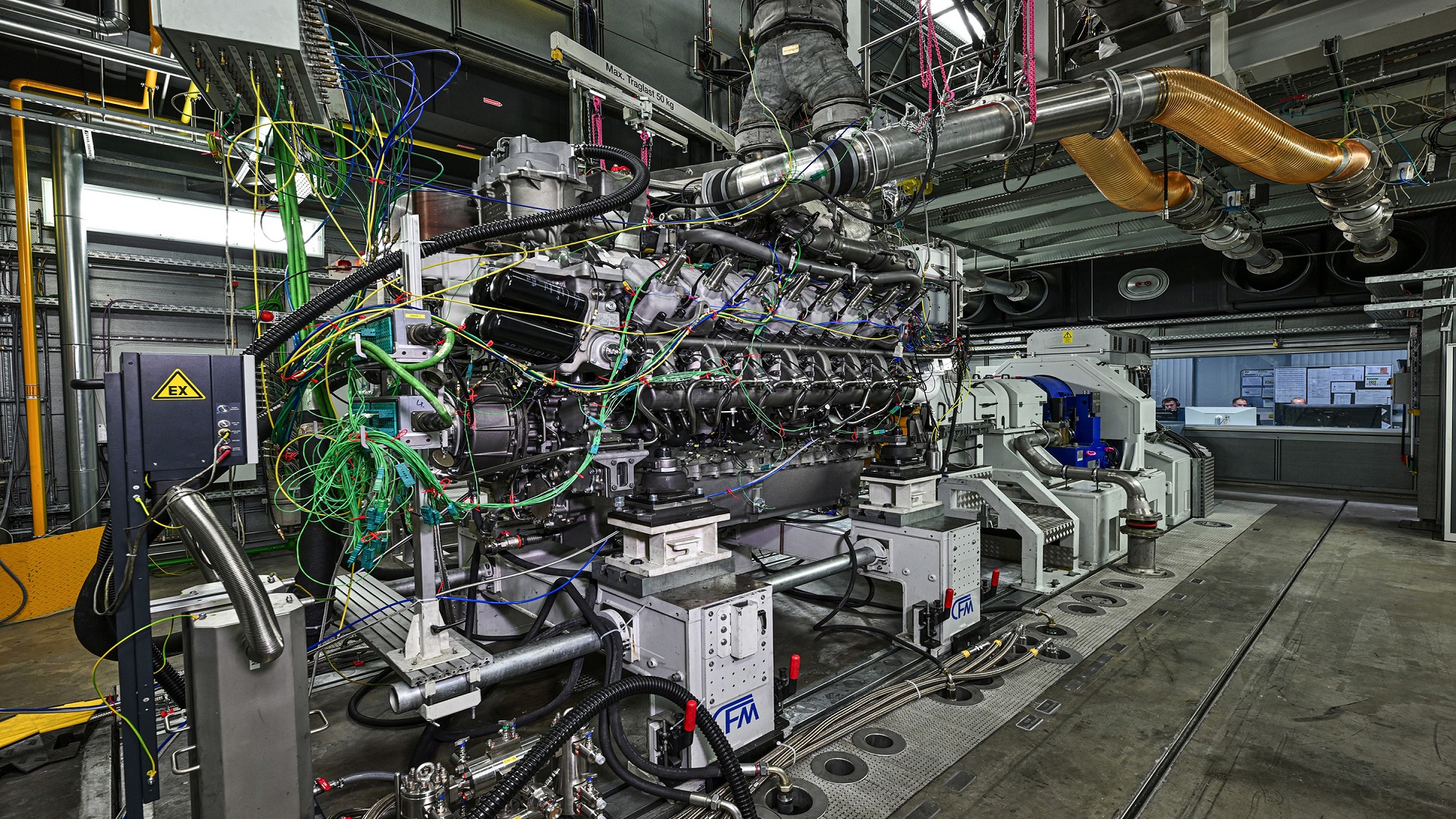Top Stories
Rolls-Royce Unveils First Methanol Engine, Revolutionizing Shipping

BREAKING NEWS: Rolls-Royce has just completed successful tests of the world’s first high-speed marine engine powered entirely by methanol, marking a major breakthrough in sustainable shipping technology. Conducted at the company’s facility in Friedrichshafen, Germany, this innovative engine aims to transform ship propulsion systems and significantly reduce carbon emissions in the maritime industry.
This groundbreaking development is part of the meOHmare research project, a collaborative effort that includes fuel injection specialist Woodward L’Orange GmbH and research institute WTZ Roßlau. With funding from the German Federal Ministry for Economic Affairs and Energy, the initiative seeks to develop a comprehensive, CO2-neutral, high-speed engine concept by the end of 2025.
“This is a genuine world first,” stated Jörg Stratmann, CEO of Rolls-Royce Power Systems AG. “No other high-speed engine in this performance class currently operates solely on methanol.” The success of this project could reshape the future of shipping, making it a pivotal moment for the industry.
Unlike traditional diesel engines, methanol is a colorless liquid alcohol that requires a complete redesign of the injection system. Rolls-Royce engineers have meticulously reconfigured the entire combustion process, turbocharging system, and engine controls to accommodate methanol fuel. “Initial tests show that the engine is running smoothly – now it’s time for fine-tuning,” said Johannes Kech, head of methanol engine development at Rolls-Royce.
Methanol has emerged as a leading candidate for decarbonizing maritime transport, offering nearly CO2-neutral operation when produced using renewable energy through power-to-X technology. It is biodegradable, easy to store, and generates significantly fewer pollutants compared to fossil fuels, making it ideal for ferries, yachts, and offshore vessels striving to meet stringent environmental standards.
“We are investing specifically in future technologies to provide efficient ways for our customers to reduce CO2 emissions,” Stratmann continued. This commitment emphasizes Rolls-Royce’s ambition to maintain a leading role in sustainable propulsion systems.
Denise Kurtulus, senior vice president of global marine at Rolls-Royce, emphasized the test’s significance, stating, “This marks a turning point for sustainable shipping.” She noted that the successful development of the single-fuel methanol engine represents an attractive solution for operators aiming to minimize their carbon footprint. “The task now is to create the framework conditions for wider use,” she added.
The company further revealed that the methanol engine aligns with its strategy to expand its marine portfolio with lower-carbon technologies. Rolls-Royce is also working on a dual-fuel concept that will allow vessels to use both methanol and diesel, providing a transitional solution while green methanol supply chains are established.
“Methanol is the fuel of the future in shipping – clean, efficient, and climate-friendly,” Kurtulus concluded. “It burns with significantly lower emissions than fossil fuels and possesses a high energy density compared to other sustainable energy sources.”
As the maritime industry faces increasing pressure to reduce emissions, this pioneering development by Rolls-Royce could set a new standard for environmental responsibility in shipping. The implications of this technology could be vast, influencing regulations and operational practices worldwide.
Stay tuned for further updates on this developing story as Rolls-Royce continues its commitment to pioneering sustainable solutions in marine technology.
-

 Science2 weeks ago
Science2 weeks agoResearchers Challenge 200-Year-Old Physics Principle with Atomic Engines
-

 Politics2 weeks ago
Politics2 weeks agoNHP Foundation Secures Land for 158 Affordable Apartments in Denver
-

 World3 days ago
World3 days agoBoeing’s Aircraft Production: Assessing Numbers and Challenges
-

 Lifestyle3 days ago
Lifestyle3 days agoRed Bluff High School’s Elli Nolan Named Rotary Student of the Month
-

 Health2 weeks ago
Health2 weeks agoNeuroscientist Advocates for Flag Football Until Age 14
-

 Lifestyle2 weeks ago
Lifestyle2 weeks agoLongtime Friends Face Heartbreak After Loss and Isolation
-

 Science3 days ago
Science3 days agoAI Misidentifies Doritos Bag as Gun, Triggers Police Response
-

 Business2 weeks ago
Business2 weeks agoSpirit Airlines Cuts Workforce with Furloughs for 365 Pilots
-

 World2 weeks ago
World2 weeks agoGlobal Military Spending: Air Forces Ranked by Budget and Capability
-

 Top Stories4 days ago
Top Stories4 days agoUrgent Search for Suspect Who Exposed Himself to Teen Girl
-

 Politics2 weeks ago
Politics2 weeks agoIsraeli Air Strikes in Lebanon Kill One, Wound Seven Amid Tensions
-

 Health2 weeks ago
Health2 weeks agoFDA Launches Fast-Track Review for Nine Innovative Therapies









